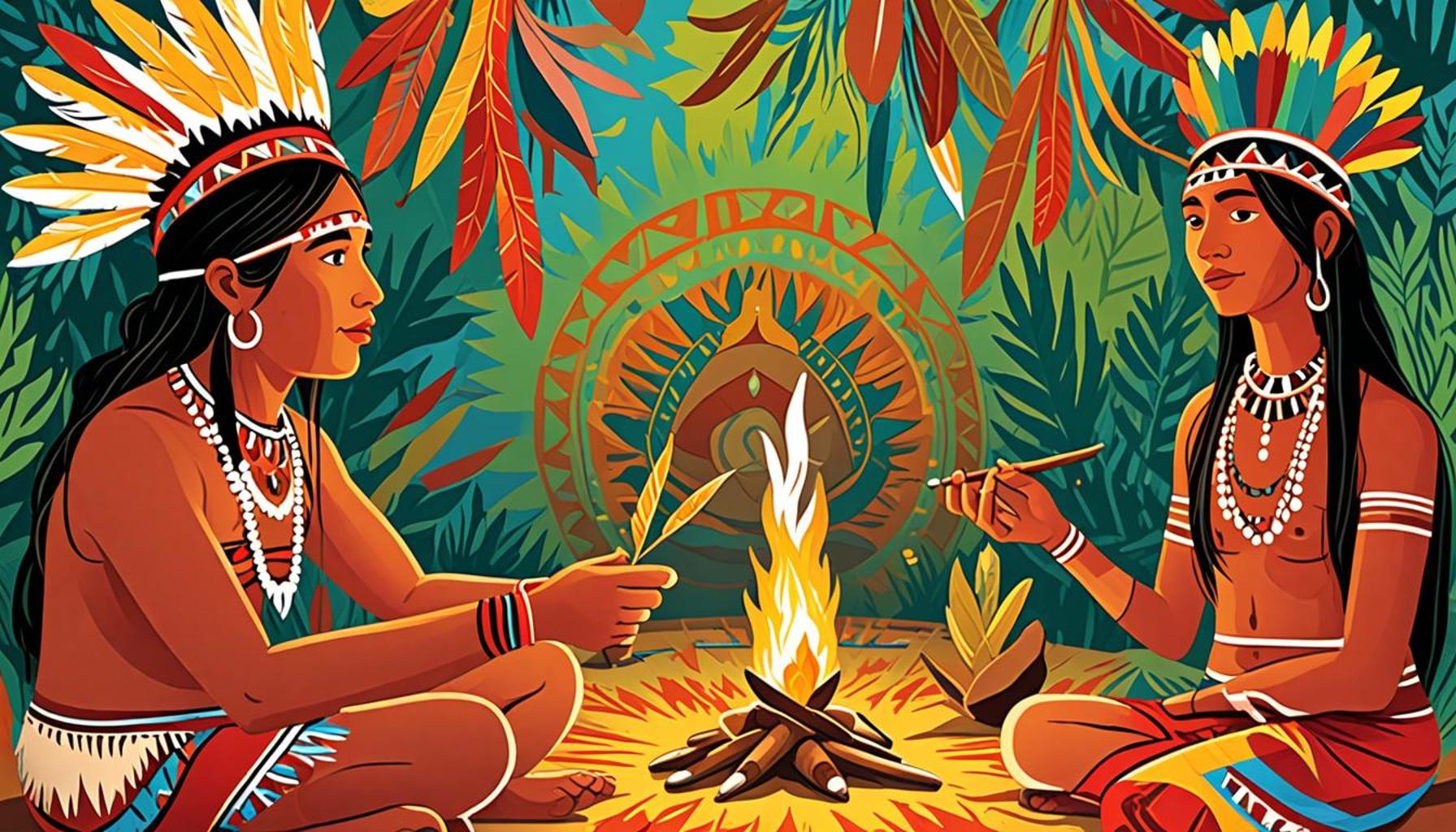Interactions with Indigenous Communities: Guidelines to Learn and Respect Ancestral Cultures

Exploring the Depth of Indigenous Cultures
Interactions with Indigenous communities offer a profound opportunity for enriching experiences and deep learning that often transcend conventional social paradigms. These cultures, which have thrived for thousands of years, are characterized by their unique traditions, languages, art forms, and spiritual beliefs. Engaging with these communities can provide invaluable insights into the complexities of the human experience, particularly regarding our interconnectedness with the environment and our responsibilities towards it.
However, it is crucial to approach these interactions with a lens of sensitivity and respect. To create meaningful relationships and exchanges, the following guidelines must be carefully considered:
- Listen Actively: Engaging with an open heart and mind allows community voices to lead conversations, ensuring an authentic exchange of ideas. It’s essential to prioritize listening over speaking, as this fosters trust and shows genuine interest in their perspectives.
- Educate Yourself: Before initiating contact, it is beneficial to learn about the local history, cultural practices, and current issues faced by Indigenous peoples. Understanding the context can deepen conversations and illustrate a commitment to respectful engagement.
- Recognize Sovereignty: Indigenous communities are self-governing entities with their own rights, laws, and regulations. Acknowledging their sovereignty promotes respectful dialogue and cooperation.
Respecting ancestral cultures is vital for building trust and creating an atmosphere conducive to mutual learning. Simple actions such as asking for permission to observe or participate in cultural practices can significantly enhance goodwill and foster genuine exchange. For example, participating in a traditional dance or ceremony with the consent of community elders demonstrates recognition and appreciation of their heritage.
The landscapes of the United States are rich in Indigenous heritage, showcasing diverse nations such as the Navajo, Lakota, and Cherokee. Each tribe embodies specific customs, myths, and belief systems, reflecting a wide array of experiences and worldviews. For instance, the Navajo people have a profound connection to the land, often expressed through their weaving and artistry, which incorporates elements of nature and spirituality. In contrast, the Lakota’s emphasis on the concept of ‘Wíiyóhpa’, or the ‘sacred connection to all beings’, highlights their holistic approach to life and nature.
By fostering respectful interactions, we not only honor these rich cultures but also support their ongoing efforts to share their stories and traditions with the world. This journey of learning and connection can significantly enhance our understanding of the past and present, creating a tapestry that honors the contributions of Indigenous peoples to society. Engaging with these vibrant cultures is not merely an educational pursuit; it is an opportunity to reflect on our shared humanity and the myriad ways we can learn from one another to create a more inclusive future.

DIVE DEEPER: Click here to discover itineraries
Building Bridges Through Understanding
Engaging with Indigenous communities requires delicate navigation of cultural sensitivities and historical contexts. Many Indigenous peoples reside in lands that have witnessed centuries of resilience amidst adversity. To engage thoughtfully, it is essential to recognize the unique position these communities hold, intertwined with their ancestral heritage. The guidelines outlined here serve as a foundation for establishing respectful and meaningful interactions.
Listening becomes an art form when approached with genuine curiosity. While sharing narratives is integral to any community, it is vital to prioritize Indigenous voices. This practice not only demonstrates respect but also enhances one’s comprehension of the rich tapestry of Indigenous cultures. Refraining from making assumptions about their experiences and allowing community members to narrate their own stories creates an environment of mutual trust.
Educational engagement plays a pivotal role in fostering understanding. Armed with knowledge about the history, language, and customs of Indigenous peoples, individuals can navigate conversations more effectively. For example, the struggles of the Sioux tribe in the face of historical treaties reflect broader themes regarding sovereignty and self-determination. Familiarizing oneself with these elements allows for richer dialogues that honor their past and acknowledge their current realities.
Another fundamental aspect of respectful interactions lies in the recognition of Indigenous sovereignty. Many tribes operate according to their own governance structures, distinct from local, state, or federal regulations. To engage suitably, it is important to respect their decision-making processes and cultural protocols—whether that means seeking permission for involvement in traditional events or understanding regulations governing sacred sites.
As you dive deeper into Indigenous cultures, consider these essential practices to cultivate goodwill:
- Show Intentional Respect: Always ask for consent before documenting or sharing cultural practices. This demonstrates an appreciation for their knowledge and heritage.
- Participate Thoughtfully: If invited to join in cultural ceremonies or practices, engage respectfully, ensuring you abide by the customs and expectations of the host community.
- Support Indigenous Voices: Embrace opportunities that empower Indigenous narratives—whether promoting their art, literature, or initiatives, supporting economic and cultural sustainability is always important.
Emphasizing these practices not only enhances personal experiences but also strengthens community ties. It can help bridge the gaps that have historically existed between Indigenous communities and the broader society. In a nation characterized by pervasive narratives, understanding Indigenous perspectives leads to a more comprehensive portrayal of history that embraces diversity and complexity.
Ultimately, the journey of learning from Indigenous cultures contributes to a greater appreciation for our shared humanity and resilience. By engaging intentionally with these communities, individuals have the chance to enrich their worldview while simultaneously honoring the legacies that shape the land we inhabit today.
| Advantage | Impact |
|---|---|
| Enhanced Cultural Understanding | Fosters deeper appreciation of Indigenous perspectives, traditions, and values. |
| Strengthened Community Relationships | Encourages collaboration, building trust between communities and external partners. |
| Resilience and Preservation of Traditions | Supports efforts to maintain and revitalise Indigenous languages and practices. |
| Promotion of Sustainable Practices | Encourages respect for natural resources aligned with traditional ecological knowledge. |
The interactions with Indigenous communities serve as a vital channel to comprehend and engage with ancestral cultures. By enhancing cultural understanding, individuals gain a richer insight into the complexities and nuances that define these unique societies. Strengthening community relationships establishes a groundwork of trust that can pave the way for fruitful collaborations, ultimately benefiting both Indigenous and non-Indigenous parties.Moreover, the preservation of traditions such as language and rituals is critical for the resilience of Indigenous identities. This can lead to initiatives that not only protect their cultural heritage but also foster innovation through the combination of traditional knowledge and contemporary practices. Lastly, the promotion of sustainable practices highlights the essential role that respect for the environment plays in both traditional lifestyles and modern sustainability efforts. This multifaceted approach underscores the importance of mutual respect and active engagement in the journey to learn from each other.
DISCOVER MORE: Click here for family-friendly relaxation ideas
Engagement Through Collaboration and Support
Interacting with Indigenous communities transcends mere conversation; it involves collaborative engagement aimed at mutual benefit. Foundations of collaboration lie in understanding, valuing, and actively supporting Indigenous-led initiatives. Creating sustainable partnerships allows both parties to learn from each other while respecting cultural boundaries. Working alongside Indigenous organizations not only amplifies their voices but also elevates efforts to preserve ancestral traditions. Collaboration can take many forms, from participating in community-led research to supporting educational programs designed by the tribes themselves.
Investing in Indigenous economies is another crucial element of respectful interactions. Many Indigenous communities possess unique cultural products, from traditional crafts to authentic culinary experiences. By purchasing from Indigenous artisans and supporting Native-owned businesses, you not only contribute to their economic sustainability but also validate their cultural expression. This transactional respect fosters a sense of pride and ownership within the community while educating consumers about the significance of Indigenous art and culture. Programs that promote fair trade practices and ensure equitable profit-sharing further enhance these economic ties.
It is also essential to recognize the importance of cultural preservation and the ongoing challenges that Indigenous communities face. In many areas, land rights issues, resource extraction, climate change, and systemic inequality threaten the survival of traditional practices. Engaging with Indigenous peoples can involve advocating for policies and initiatives that protect their lands, cultures, and ways of life. Grassroots efforts that combine Indigenous knowledge with modern frameworks—in fields such as environmental science and climate action—can yield solutions that respect ancestral wisdom while addressing contemporary challenges.
Promoting cultural exchange can lead to deeper understanding and appreciation of diverse perspectives. Organizing cultural festivals or community events that center Indigenous voices creates platforms for storytelling and sharing. Documentaries that highlight Indigenous issues or art exhibits showcasing their creative expressions offer valuable insights and open the door for conversations that respect their narratives. By actively participating in such events, individuals can engage with, honor, and celebrate Indigenous cultures while also initiating discussions that question historical injustices and seek to pave the way for reconciliation.
Furthermore, educational programs rooted in Indigenous knowledge serve as powerful tools to reshape societal understanding. Integrating Indigenous perspectives into school curricula fosters respect through early education. When children learn about history from diverse viewpoints, including those of Indigenous communities, it lays the groundwork for a culturally competent future generation. Collaborative efforts to create educational materials that reflect Indigenous voices can bridge gaps and illuminate historical contexts often overlooked in mainstream storytelling.
As you explore these avenues for engagement, keep in mind that the essence of interactions with Indigenous communities rests on establishing and nurturing trust. Building meaningful connections rooted in patience, reciprocity, and empathy sustains long-term relationships, ultimately resourcing both Indigenous communities and those who seek to learn from them. By evolving interactions beyond superficial engagements, individuals can contribute to a shared vision that respects the richness of Indigenous cultures and promotes communal harmony.
DIVE DEEPER: Click here to uncover more cultural adventures
Conclusion: A Pathway to Understanding and Respect
In wrapping up our exploration of interactions with Indigenous communities, it becomes clear that genuine engagement requires a framework rooted in respect and mutual understanding. The guidelines discussed prioritize recognition of ancestral cultures, encouraging individuals and organizations to immerse themselves in the rich histories, traditions, and contemporary challenges faced by these communities. By engaging in collaborative partnerships, advocating for cultural preservation, and investing in Indigenous economies, we foster a reciprocal relationship that honors their heritage while enriching our own perspectives.
Furthermore, as society grapples with historical injustices, there exists an obligation to advocate for policy changes that safeguard Indigenous rights. Integrating Indigenous knowledge within educational frameworks is vital in shaping an informed populace that values diversity and equity. Emphasizing cultural exchange through festivals and community events can significantly enhance societal understanding, paving the way for fruitful dialogues about reconciliation and healing.
Ultimately, it is our collective responsibility to approach interactions with patience, empathy, and a sincere willingness to learn. By nurturing relationships built on trust, we can contribute to a vibrant, inclusive future that respects and celebrates the unique contributions of Indigenous cultures. Through informed and respectful engagement, individuals can help cultivate a society that not only acknowledges the past but also embraces the future with an open heart and an inclusive spirit.


